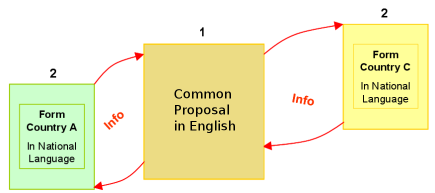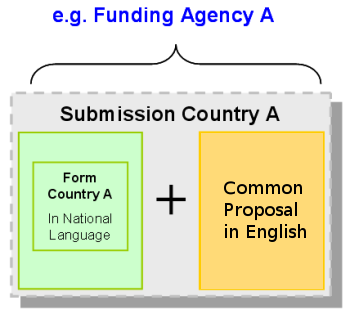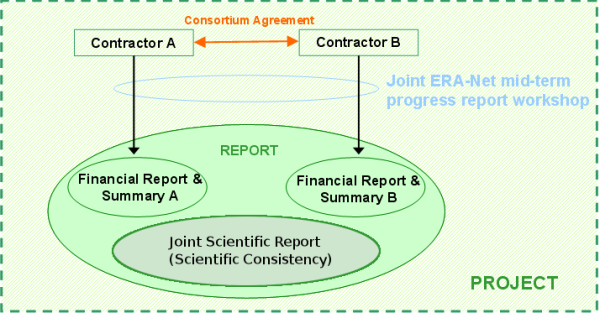Joint Call Small scale combustion
ERA-Net-BIOENERGY is a network of national R&D programmes focusing on bioenergy. The overall goal of this initiative is to promote European collaboration in bioenergy research. This document is an invitation to take part in a joint pilot call by the ERA-Net-BIOENERGY partners from Austria, Finland, Germany, Sweden and United Kingdom focussing on small scale combustion.
Background
The European Commission actively supports the use of biomass for energy. The aim is to increase the use of renewable energy and to avoid an escalation of CO2 concentration in the atmosphere. Partly because of this support,, the use of wood and non-wood biomass fuels is increasing across the EU. Small-scale biomass combustion is normally used for heat production, but electricity production is also possible (combined heat and power production). Biomass is often used in small-scale combustion. This is due to the low availability of local fuel reserves and high transportation costs. Low costs associated with short transportation distances have increased the interest in using various biofuels in small-scale heating plants.
Using non-fossil fuels has numerous advantages. However, some of the emissions produced can still be harmful e.g. soot, small particulates, hydrocarbons and carbon monoxide and in some cases also NOx. Small-scale biomass combustion has been proven to be a very important cause of fine particle emissions together with traffic. This problem is recognized by authorities in the EU-countries and new and more stringent regulations limiting the emissions are expected in the near future. Since there are currently no common international standards for emission control from small-scale biofuel burning, national or even regional emission standards are used.
So far, small-scale combustion has not had a strong role in the EU’s research programmes and no large international research projects are going on at present. However, there are many national research activities taking place in the area of small-scale biomass combustion, funded by national research programmes. The aim of this pilot call is to encourage joint working in this important area between researchers in the participating countries listed above.
Aims of the call
This call provides new opportunities for researchers and stakeholders to take part in multilateral cooperation in the field of small scale combustion and to gain added value for all participants. Projects are expected to provide knowledge through research in order to develop solutions which are economically competitive, reliable and acceptable in terms of increased efficiency and reduced emissions as regards small scale combustion of solid biomass. In addition, the funding agencies organising this joint call will be aiming to investigate best practises for arrangement of joint calls and subsequent evaluation of the resulting projects. We will also be aiming to provide a platform for the exchange of information and knowledge related to small scale biomass combustion research in different countries through workshops and other dissemination activities.
Joint call topics
Proposals should be submitted within one of the four topics below:
- Combustion control and fuel input/supply in small scale combustion
The overall objective of projects within this topic is to provide applied research to assist in the development of automatic small scale combustion systems for wood and non-wood biomass which are economically competitive, reliable and safe with high efficiency and low emissions.
- Clean combustion and emission control
The overall objective of projects within this topic is to contribute towards the minimization of emissions from biomass combustion and thereby to avoid environmental drawbacks in the public acceptance of bio heat systems by improving existing and/or developing new clean and efficient combustion technologies, emission control strategies and secondary measures for flue gas cleaning for wood and non-wood biomass. Of particular interest is the minimization of slagging and fouling, CxHy-, CO- and small particle emissions.
- Test methods for non wood small-scale combustion plants
The overall objective of projects within this topic is to contribute through research to the development of uniform and comparable European test methods for small scale combustion furnaces for solid biomass from agriculture like straw and energy grain.
- Small scale CHP (Combined Heat and Power production)
The overall objective of projects within this topic is to provide applied research to assist in the development of efficient, economically competitive and reliable small scale CHP systems for solid biomass.
General instructions for proposers
Consortium
Proposals are invited from universities and research organisations following national eligibility criteria [Be aware that there are differences between national criteria!]. Proposals should include partners from at least two of the countries involved in the call. Research outputs are expected to be publicly available. Proposers are encouraged wherever appropriate to seek collaboration with industry and/or other relevant stakeholders. The project partners are expected to sign a consortium agreement in order to agree on Intellectual Property Rights (IPR) and other relevant issues dealing with responsibilities within the project and exploitation of results.
Funding arrangements
Research will be funded from national sources and will be subject to their national funding rules. Each participating funding agency has made separate arrangements for funding the national participants. Further details can be obtained from your national contact.
Projects are expected to start between 1st of November 2006 and 31st of March 2007 but must be completed by 31st of March 2008.
Deadline for Submission
Proposals must be submitted to your participating national funding agency by 3rd of May 2006.
Structure of Submission

The documentation you have to submit consists of two parts.
- A Common proposal written in English which contains all relevant information about the project. This will be evaluated as one entity by an international jury and will form the basis for the funding decision.
- A standard application form from your funding agency describing the involvement and funding requirements of each national proposer (see National Guidelines section below for details of these requirements). The information within this document should be extracted from the Common proposal as these documents will not be seen by the international jury.

These documents should be submitted by each project partner to their participating national funding agency (see list of national contacts below).
Structure of Common Proposal
The Common Proposal document should be structured as follows:
- Project Title (max. 150 characters)
- Duration in months (Considering that project work must be completed by March 31st 2008)
- Applicant details (institution, name of contact person, contact information)
- Financial summary table - totals only, (in €) for overall costs, costs per partner, required national funding per partner
- Executive summary (300 words)
- Detailed description of project (objectives, materials and methods, state of the art and innovative contribution of the project) (max. 5 pages)
- Detailed description of consortium (role of each partner organisation and stakeholders involved)
- Project planning and management, this section should include a graphical work plan), deliverables, milestones, work packages (i.e. what is done by whom?) together with details of assigned resources/man-hours and associated budgets (max. 10 pages)
- Communication of project outcomes (implementation and exploitation plan, contribution to the research and development competence of each of the countries) (max. 3 pages)
- Background and competences of participating organisations and individuals (max. 1 page per partner organisation plus ½ page per key person involved).
The proposal should be written using the Times New Roman font with a minimum acceptable font size of 10.
Proposal evaluation
The proposals will be evaluated by an international evaluation jury, selected by the funding organisations involved in the call. The international evaluation jury will provide recommendations for funding. The final decisions will be made by the ERA-Net Bioenergy partners.
The evaluation meeting will take place during September 2006 and the funding decisions will be communicated by the end of October 2006.
Project selection criteria are:
- scientific quality
- fit into the current call
- technology and knowledge to be developed
- contribution to cooperation within the participating ERA-Net Bioenergy countries
- quality of project management arrangements
- quality of arrangements for implementation and exploitation of results
- available resources
Beyond these instructions above, your participating national funding agency’s guidelines should be followed. If you intend to participate in this call please contact your national contact person.
Project Monitoring and Expected Deliverables
In addition to the standard requirements of your funding agency we will require the following:
- Participation and presentation of Mid-term progress at a joint ERA-Net workshop (Autumn 2007)
- A common Final Report (written in English) describing the activities and outcomes of the work. Detailed requirements for this report will be distributed to successful applicants once the projects have started.

Participating countries / National contact points
Austria
BMVIT, FFG
Michael Hübner
Tel.: +43 (1) 71162-652922
E-mail: michael.huebner@bmk.gv.at
Web: www.ENERGIESYSTEMEderZUKUNFT.at
Finland
Tekes
Pia Salokoski
Tel.: +358 10 60 55672
E-mail: pia.salokoski@tekes.fi
Web: www.tekes.fi
Germany
Fachagentur Nachwachsender Rohstoffe
Verena Foth
Tel.: +49 (0) 3843/6930-146
E-mail: v.foth@fnr.de
Birger Kerckow
Tel.: +49 (0) 3843/6930-125
E-mail: b. kerckow@fnr.de
Web: www.fnr.de
Sweden
STEM
Erik Hedar
Tel.: +46 16 544 22 38
E-mail: erik.hedar@stem.se
Web: www.stem.se
The United Kingdom
EPSRC
Andrew Davies
Tel.: +44 (0)1793 44 44 41
E-mail: andrew.davies@epsrc.ac.uk
Web: www.epsrc.ac.uk/energy
